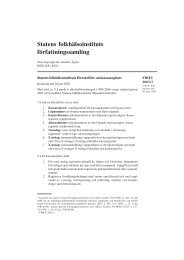Abstract – Folkhälsostämman 2012 - Statens folkhälsoinstitut
Abstract – Folkhälsostämman 2012 - Statens folkhälsoinstitut
Abstract – Folkhälsostämman 2012 - Statens folkhälsoinstitut
Create successful ePaper yourself
Turn your PDF publications into a flip-book with our unique Google optimized e-Paper software.
chAllengeS FOr PublIc heAlth In chAngIng tImeS<br />
Professor Lindsey M Davies<br />
President, uK Faculty of Public health<br />
Public health is the science and art of promoting health and well-being, preventing illhealth<br />
and prolonging life through the organised efforts of society. This is a straightforward,<br />
albeit challenging, definition which has stood the test of time. It encompasses<br />
the concepts of evidence, judgment and action to meet the needs of whole populations.<br />
But health and well-being needs are evolving constantly, as are the technologies and<br />
approaches available to address them. Economic, social and environmental contexts<br />
are rarely static and can sometimes change remarkably quickly: consider the banking<br />
crisis, the ‘Arab spring’ and the recent Japanese nuclear disaster, for example. Some<br />
health and wellbeing needs require an immediate response, whilst others can only be<br />
addressed by concerted effort from many organisations over a sustained period of<br />
time. How, then, should a society organise itself to protect and improve health and<br />
well-being? What kind of public health systems are needed to inspire, initiate and<br />
facilitate change? The nature and scale of a public health system will, of course, vary<br />
with the size and location of the population it serves. A system designed to meet the<br />
needs of a small local community or the employees of a single factory will be very different<br />
from that required to serve a whole country or a multinational organisation.<br />
Experience suggests, however, that all public health systems, wherever they are and<br />
whatever the scale of the population served, are more likely to be successful if they<br />
demonstrate some core characteristics. In this presentation, Professor Davies will propose<br />
that public health systems should:<br />
• Address all three domains of public health<br />
• Engage the public, private and not-for-profit sectors<br />
• Have strong political and operational leadership<br />
• Incorporate clear accountabilities<br />
• Include well-defined ‘levers’ for change<br />
• Work transparently<br />
• Interact with the public<br />
• Encourage organisations <strong>–</strong> and individuals <strong>–</strong> to work together<br />
• Develop, use and disseminate evidence<br />
• Demand high standards of professional practice<br />
• Pay serious attention to education and training<br />
• Have sufficient resources <strong>–</strong> staff, skill mix and funds<br />
• Welcome <strong>–</strong> and seek out <strong>–</strong> new players and new ideas<br />
• Adapt rapidly to changing needs and environments<br />
• Have the capacity to take a long term view<br />
Participants will be invited to explore the validity of this proposition and to reflect<br />
upon the extent to which public health systems with which they are familiar meet<br />
these expectations.<br />
ABSTRACT <strong>–</strong> FOLKHÄLSOSTÄMMAN <strong>2012</strong> 7<br />
FOLKHÄLSANS FRAmTIDA UTmANINGAR

















